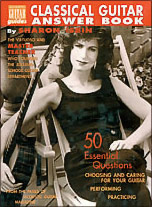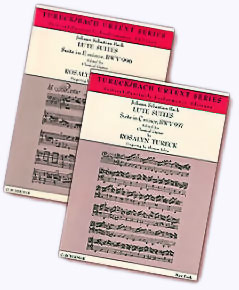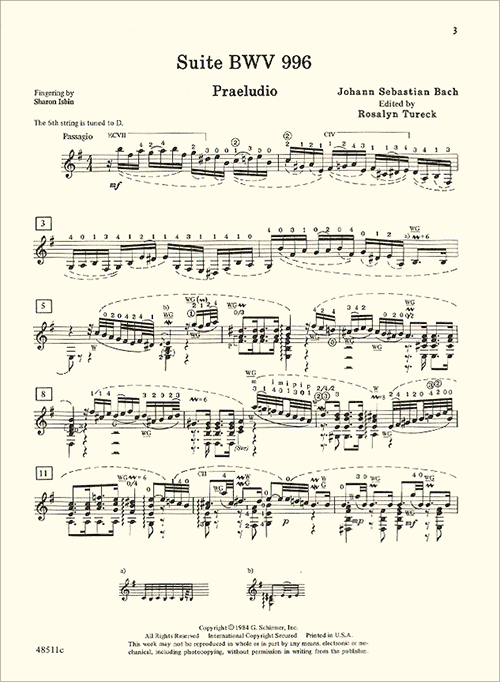
By Sharon Isbin
Table of Contents
Foreword by Jeffrey Pepper Rodgers
Introduction by Sharon Isbin
Equipment
Auditioning a Guitar
Choosing the Right Scale Length
Cedar vs. Spruce Tops
Instrument Care and Repair
Locating Rattles
Testing Strings
Changing Strings
Footstools
Amplification Setups
Traveling with a Guitar
Starters
Tuning Up
Finding a Comfortable Playing Position
Playing Lefty
Lessons for Children
Singles Notes vs. Chords for Beginners
Finding the Right Teacher
Studying with a Teacher vs.
Using Method Books
Studying Multiple Systems
Choosing a Guitar Program
Fingernails and Calluses
Playing with Fingernails
Fingernail First Aid
Caring for Calluses
Bass-String Squeaks
Practicing
Structuring Practice Time
Using a Metronome
Warming Up for Performance
Taking a Vacation from the Guitar
Repertoire and Interpretation
Basic Repertoire
Keeping Abreast of New Music
New Music for Classical Audiences
|
5
7
9
9
10
11
11
13
14
14
15
16
18
19
19
20
21
21
21
22
23
23
24
25
25
26
26
26
29
29
29
30
30
33
33
33
34 |
 |
Embellishing Composed Music
Ensemble Playing
Using Altered Tunings
Handling Rests in a Score
Refining Techniques
Harmonics
Free Strokes and Rest Strokes
Tremolo Exercises
Stopping Open Strings
Cross-String Ornaments
Percussive Techniques
Roadblocks
Breathing
Making Faces
Reading High Notes on the Staff
Hand Fatigue
Rebuilding Hand Muscles after Injury
Where Mind Meets Music
Memorizing Tips
Relaxation and Visualization for Performing
Tripping Over Mistakes
Making a Career
Approaching Music Publishers
Finding a Niche in the Classical World
NEW CHAPTERS IN THE 2nd EDITION
Notes on Concert Programming
(includes sample concert programs)
Concerti for Guitar and Orchestra
Performed by Sharon Isbin
Nylon-String Guitar Makers
Salons & Shops Specializing in
Classical Guitar
Organizations
Classical Guitar Education Programs
Books
Periodicals
About the Author
Selected Recordings by Sharon Isbin |
35
36
37
37
39
39
40
42
42
43
47
49
49
50
50
51
52
53
53
54
56
57
57
57
59
68
70
75
76
77
80
81
82
84 |

When Sharon Isbin reaches for her guitar, closes her eyes, and begins to play,
her music casts a spell. From the very first notes, her deep immersion in the
music and her practiced and precise touch on the instrument allow her to cut
right to the heart of the piece she’s playing—and of the listeners themselves.
In those moments, it doesn’t matter who the composer is or what style or genre
the piece is in; the communication is pure, visceral, and transporting.
In addition to hearing Isbin perform, I’ve had the good fortune to work closely
with her in my role as editor of Acoustic Guitar. Her Master Class column, in
which she answered readers’ questions, appeared in our premier issue in the
summer of 1990 and in every issue for the next four years. Although Isbin is a
"classical" guitarist, it became clear right away that as a writer she cut
through the categories of style and genre just as she does as a player. Many of
the issues that she discussed are equally applicable to a steel-string strummer
and to an aspiring classical player. The readers of Acoustic Guitar picked up on
this quality in Isbin’s work right away, and what ensued were four years of
wide-ranging and thought-provoking exchanges that form the basis of this book.
Reading over the 50 collected questions and answers in the Classical Guitar Answer
Book, I’m struck by how much Isbin’s commitment and caring shine through. There’s
a lot of inspiring advice to be found in these pages—as well as plenty of
calls for hard work and dedication—that make me want to open my guitar case
and get on with the quest of becoming a better musician. Onward and upward...
Jeffrey Pepper Rodgers |
 When you have guitar questions, reach for the book that has the answers.
When you have guitar questions, reach for the book that has the answers.
‘How can I memorize pieces more effectively for performance? How often should I
change strings? What’s the best way to structure practice time? What are the
differences between spruce and cedar guitar tops?’
Sharon Isbin, the virtuoso concert artist who heads the guitar department at the
Juilliard School of Music, has answered scores of questions like these in her
acclaimed Acoustic Guitar Magazine Master Class column.
Now Sharon Isbin and Jeffrey Pepper Rodgers, editor of Acoustic Guitar Magazine,
have chosen 50 essential Master Class questions and answers for the Classical
Guitar Answer Book.
This is a book for every guitar enthusiast, teacher, and student. No matter what
styles of music you play, or the kind of guitar you play on, you’ll find a wealth
of information and tips in the Classical Guitar Answer Book.
Answers that will help you learn new music more easily. Use your practice time
more productively. Evaluate a new guitar more knowledgeably. Avoid fatigue and
injury. Take a more balanced and thoughtful approach to all the music you play
and listen to.
Order as a PDF Download from
AcousticGuitar Store. |

 The Lute Music of J.S. Bach
The Lute Music of J.S. Bach
Researched, edited and transcribed for classical guitar by noted Baroque
musicologist
Rosalyn Tureck.
Fingered by Sharon Isbin.
These two editions have received rave reviews from guitarists around the world,
being called “the most
comprehensively scholarly edition to date of any guitar version of a work of
Bach” —Guitar International. Complete with critical notes, manuscript
references, embellishments, and performance practice information. Invaluable
editions for the Bach/Baroque enthusiast.
BWV996 (E Minor) 5033650 G. Schirmer
Order Online in U.S. from
Hal Leonard
In U.K. from
Music Room
BWV997 (A Minor) 50504280 G. Schirmer
Order Online in U.S. from
Hal Leonard
In U.K. from
Music Room
You can order all of these publications from: 800-637-2852
If phoning outside the U.S. or
Canada, phone 414-774-3630 and ask for the Music Dispatch department.
Or from:
Guitar Solo Publications, 230 Townsend Street, San Francisco, CA 94107-1720 USA
Tel: 415-896-1144 Fax: 415-896-1155
|
Table of Contents
Lute Suite BWV 996
I. SOURCES
A. MANUSCRIPTS
B. THE FACSIMILE OF THE GERBER MANUSCRIPT
C. THE GERBER AND WALTHER MANUSCRIPTS -
Agreement and Variance
1) Title
2) Instrument Designations
3) Titles of Movements
4) Clefs
5) Music Text
6) Stemming
II. FORMAT OF EDITION
A. MUSIC TEXT -- VARIANTS
B. EMBELLISHMENT AND FERMATA SYMBOLS
C. PHRASING AND ARTICULATION
D. ACCENTS
E. TEMPO
F. REPEATS
G. FINGERING
H. TECHNICAL INDICATIONS |
|
III. PERFORMANCE
A. PART-WRITING AND ARTICULATION
B. DYNAMICS
C. EMBELLISHMENT
1) General
2) Variants in Manuscripts
3) Added Embellishments
4) Embellishment realization
5) Extended list of ornaments; Trillo, Long Trill,
Appoggiatura, Schleifer, Arpeggiated chords
6) Performance of Embellishment figurations
a) Nuances in Dynamics
b) Rhythmic Fluidity
c) General requirements
IV. BACH ON THE GUITAR
A. STYLE
B. EXTENSION OF TECHNIQUES FOR STYLISTIC
GUITAR PERFORMANCE
1) Playable notes
2) Sonorities
3) Cross-string Fingering
V. PERFORMANCE OF THE SUITE MOVEMENTS |


|



